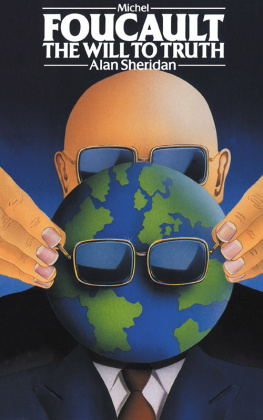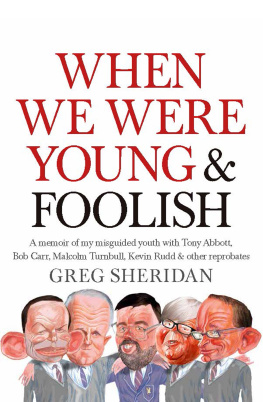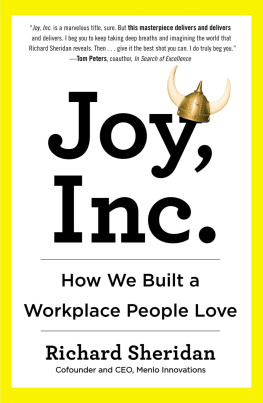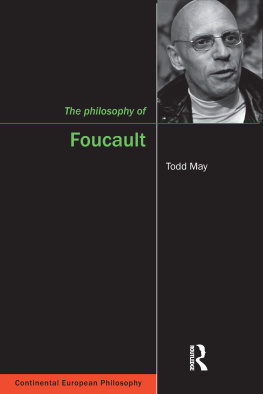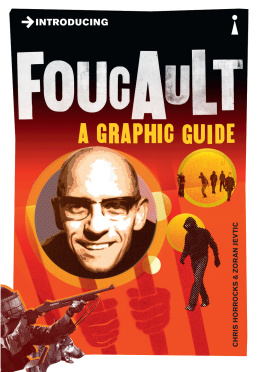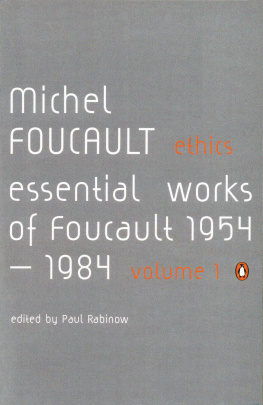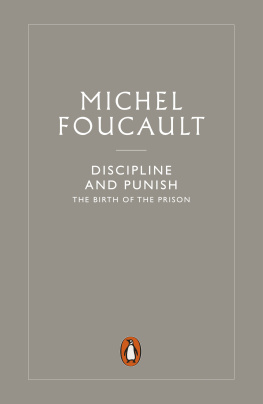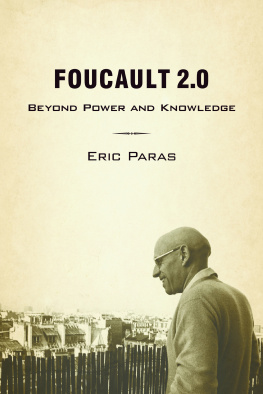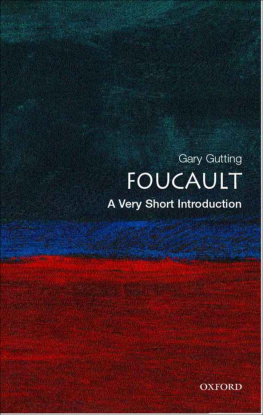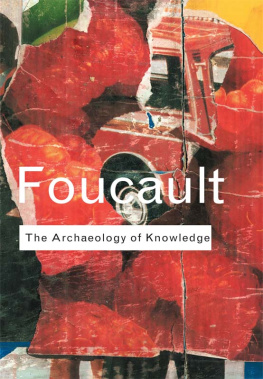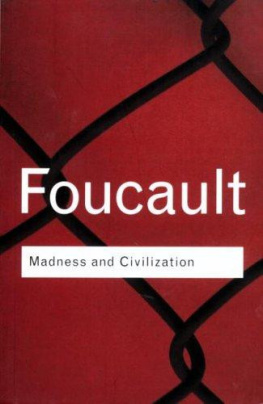MICHEL FOUCAULT
The Will to Truth
MICHEL FOUCAULT
The Will to Truth
Alan Sheridan

First published in 1980 by
Tavistock Publications Ltd
This edition published in the Taylor & Francis e-Library, 2005.
To purchase your own copy of this or any of Taylor & Francis or Routledges collection of thousands of eBooks please go to www.eBookstore.tandf.co.uk.
Published in the USA by
Tavistock Publications
in association with Methuen, Inc.
11 New Fetter Lane,
London EC4P 4EE
Simultaneously published in the USA and Canada by Routledge
29 West 35th Street, New York, NY 10001
1980 Alan Sheridan
All rights reserved. No part of this book may be reprinted or reproduced or utilized in any form or by any electronic, mechanical, or other means, now known or hereafter invented, including photocopying and recording, or in any information storage or retrieval system, without permission in writing from the publishers.
British Library Cataloguing in Publication Data
A catalogue record for this book is available from the
British Library
Library of Congress Cataloguing in Publication Data
A catalogue record for this book is available from the Library of Congress
ISBN 0-203-35921-6 Master e-book ISBN
ISBN 0-203-37177-1 (Adobe eReader Format)
ISBN 0-415-05117-7 (Print Edition)
To Bruno Taddeo Sonzogni
baccalauro in gaya scienza
Contents
Authors Note
I refer to Foucaults works by their original French titlesI use English titles only when referring to the translations as such. Each quotation is followed by a note in brackets giving page references, first to the French edition and, second, where available, to the English translation. The titles are abbreviated to two or three capital letters. Thus (HF, 212; MC, 1012) refers the reader to pages 212 of Histoire de la folie and to the corresponding passage in the translation, Madness and Civilization. Full details of publication are provided in the Bibliography. The following abbreviations of titles have been adopted:
| AK | The Archaeology of Knowledge AS Larchologie du savoir |
| BC | The Birth of the Clinic DP Discipline and Punish |
| HF | Histoire de la folie |
| HJH | Hommage Jean Hyppolite |
| HS | The History of Sexuality, vol. 1, An Introduction |
| LCP | Language, Counter-Memory, Practice |
| MC | Les mots et les choses (1st. ref.)
Madness and Civilization (2nd. ref.) |
| MIP | Mental Illness and Psychology |
| MMP | Maladie mentale et psychologie |
| NC | Naissance de la clinique |
| OD | Lordre du discours |
| OT | The Order of Things |
| PR | Moi, Pierre Rivire(1st. ref.)
I, Pierre Rivire(2nd. ref.) |
| SP | Surveiller et punir |
| VS | La volont de savoir |
Interviews and articles quoted are preceded in the Bibliography by a number. This number is given in the bracketed note that follows the quotation itself, preceded by the letter B (for Bibliography). Thus the reference B1, 751 refers to page 751 of the entry in the Bibliography preceded by the number 1.
I wish to thank Foucaults American and British publishers for permission to quote from the published translations. Excerpts from the following are reproduced by permission of Penguin Books Ltd: Discipline and Punish: The Birth of the Prison, Editions Gallimard 1975, translation Alan Sheridan; La volont de savoir, translation in this volume, Alan Sheridan. Excerpts from the following are reproduced by permission of Pantheon Books, a Division of Random House, Inc.: Madness and Civilization, translation Richard Howard, 1965 Random House, Inc.; The Birth of the Clinic, translation Alan Sheridan, 1973 Tavistock Publications Ltd.; The Archaeology of Knowledge and the Discourse on Language, translation Alan Sheridan, 1972 Tavistock Publications Ltd.; Discipline and Punish: The Birth of the Prison, translation Alan Sheridan, 1977 Alan Sheridan; The History of Sexuality, Volume I, An Introduction, translation Robert Hurley, 1978 Random House, Inc. I have taken the liberty, on occasion, of rewording the extracts quoted.
There is more ado to interpret the interpretations than to interpret the things, and there are more books upon books than upon any other subject. We do nothing but write glosses upon one another.
MICHEL DE MONTAIGNE
It may well be that we belong to an age of criticism whose lack of primary philosophy reminds us at every moment of its reign and its fatality: an age of intelligence that keeps us irremediably at a distance from an original language We are doomed historically to history, to the patient construction of discourses about discourses, and to the task of hearing what has already been said.
MICHEL FOUCAULT
Introduction
In an ideal world a book such as this would be unnecessary, indeed inconceivable; it would belong to the world of pale reflections. In the perfect world of Borges the only possible commentary would be the recopying by hand of the subjects collected works, but the conventions of our publishing industry forbid such an enterprise: an author is an altogether nobler thing than a scribe. And yet my aim is modest enough: to provide a guidebook, perhaps, profusely illustrated. Not so much, for guidebooks gain in usefulness. As the landscapes and monuments of which they speak alter and disappear, they attain by subtraction the additional status of fiction. Even the photographs say more with time. Like everything else, Foucaults books will no doubt change and finally disappear, but mine will not outlast them. Meanwhile, it must not take their place: rather it should create readers. I come not to bury beneath commentary, but to praise, as Erasmus praised Folly, by making room. In this, at least, my book will be original: few of his commentators allow him that. Even the favourably disposed seek the meaning beneath his gleaming words. But style is not an ornament: it cuts, to shape and to wound; it is a tool and a weapona stylus. So I make no apology for the length and frequency of my quotations and much of the rest is prcis or disguised quotation. Even prcis is a dangerous art: without quotation, it can be as lethal as commentary. It is not the letter that kills.
Who is Foucault? The question crops up less often than it used to. But people are still asking, with some justification, What is he? If a thinker confines himself to a single, accepted disciplineas does a Lvi-Strauss to anthropology, a Lacan to psychoanalysis, an Althusser to Marxist theoryone has at least a unified object, with recognizable limits and a recognizable history, against which one can assess his personal contribution. At the beginning of his career Foucault turned his back on two such disciplines, yet no one could say that he had founded a new one. Is he some kind of philosopher? people ask. Well, yes, in a way, one answers. He studied philosophy and has spent much of his adult life teaching it. Then why does he write not about Plato, Descartes and Kant, but about the history of madness and medicine, prisons and sexuality? Well, he is more of a historian than a philosopher, though his approach to his material is very different from that of a historian. Ah, a historian of ideas! Well, no. He has spent a lot of time and energy undermining the preconceptions and methods of the history of ideas. In fact, it was to distinguish what he was doing from the history of ideas that he coined the term archaeology of knowledge. The what? Foucault has occupied chairs of philosophy at a number of universities, but it was not until his election to the Collge de France in 1970 that he was able for the first time to provide his own description: he became Professor of the History of Systems of Thought. One senses the effort that went into the exact choice and placing of the words. It sounds like a compromise solution arrived at by a committee, rather than the proud device of a great prose stylist.
Next page
